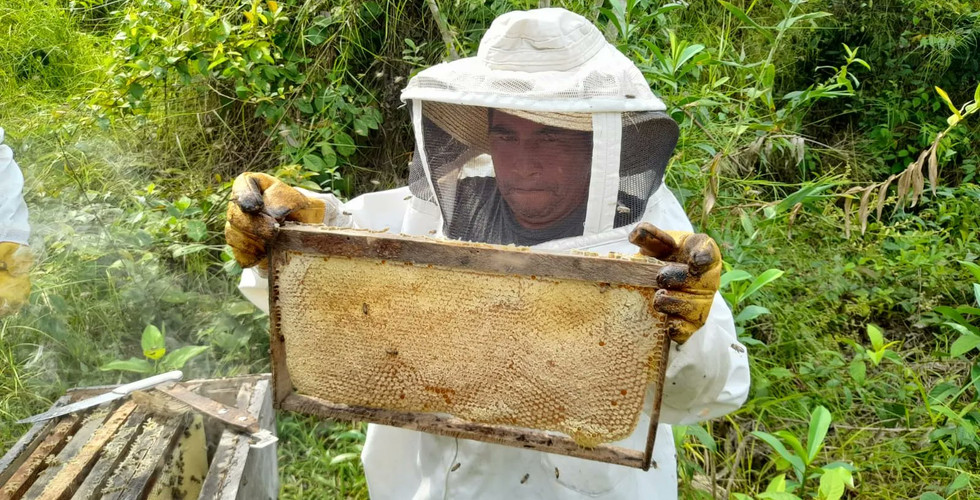Beekeeping and Agroforestry Enhance Livelihoods in Rural Guatemala
- Jun 27, 2022
- 3 min read
Updated: Jul 20, 2022
In rural communities of Guatemala, beekeeping and agroforestry can be the answer to economic uncertainty and food insecurity.
In the past year, despite the challenges presented by COVID-19 and the heavy hurricane season, the EcoLogic team, with the support of local partners, made significant progress toward the goals of supporting Sustainable Livelihoods Through Agroforestry and Beekeeping in Ixcán, Guatemala.
Diversifying income and restoring degraded land
So far, we have recruited and trained 47 novice beekeepers in the communities of Santa María Dolores, Santa María Tzejá, Cimientos de la Esperanza, San Antonio Tzejá, Machaquila II, and Nuevo San Lorenzo. We have established 499 beehives, which produced 14,410 lbs of honey in 2021.
Local beekeeper Moíses Pérez talks about the benefits beekeeping is bringing to the ecosystem and his family's economy
We recently spoke with Moisés Perez from the community of Nuevo San Lorenzo who shares that he started with two beehives and now has eight. “[Beekeeping] has helped me bring in more financial resources for my family. Through the sale of honey this April I was able to generate some additional income from the resource the bees gave me.”
In 2021, we also helped farmers in these communities establish 17.22 hectares of agroforestry parcels on degraded land -- including Inga edulis with perennial crops, particularly cardamom. Our team regularly provides technical support to the local farmers and assists in designing the agroforestry parcels' management plans.
In addition, we helped establish firebreaks and signage and aided with replanting some of the mahogany trees that were affected by weevils. We also provide support and help build the capacity of local farmers to develop the management plans needed to access Guatemala’s PROBOSQUE incentives for agroforestry and other sustainable land uses.
Thanks to the use of diversified farming systems, farmers have seen significant improvements in the quality of their soil.
Training and capacity-building
We enhance beekeeping practices by improving the dissemination of knowledge and skills and by providing beekeeping materials and capacity-building support in rural communities. Through workshops, our team trains and offers constant assistance to community members and farmers to sustain the project's continuity. The topics of the workshops go from parasite and disease control to management of registries, from packaging to marketing best practices.
We also facilitate learning exchanges between communities considering agroforestry and beekeeping activities and communities already engaged in them - so that local populations can understand the benefits that come from these activities.
EcoLogic provides training to local people in beekeeping and cardamom farming and helps them to access incentives-based conservation programs
Even during the pandemic's peak in 2020, the restrictions didn't stop our team from providing support. For instance, our field technicians had regular phone calls with beekeepers to discuss how to prepare for the honey harvest and use the extraction equipment to obtain honey free of contamination. In early 2021, we began in-person technical assistance visits again to cover the entire production process of the hives, pre- and post-harvest.
Last year, our Ixcán team conducted a learning exchange with Apiarios Flores Occidentales, a family-run honey enterprise in San Marcos, Guatemala. In addition to honey, this enterprise makes nine different products from beekeeping including pollen, royal jelly, beeswax, propolis, honey candies, and soap. We visited their installations to learn more about the production processes of these products and then shared this knowledge with the local beekeepers we work with to diversify their production and strengthen their income streams.

In addition, this June we sponsored 12 beekeepers to attend the Beekeeping Technology Transfer Center in Guatemala, one of the most technical in Central America, to contribute to their ongoing training in good beekeeping practices. They will be putting this new knowledge to use back in their apiaries and sharing it with their fellow beekeepers.
Honey provides economic resilience
During the pandemic, people started using traditional medicinal practices again to boost their immune systems, significantly increasing the local demand for honey. As a result, beekeepers sell their honey quite easily and at a good price. Honey production provides economic resilience and helps rural families in Guatemala improve their income.
"Beekeeping has helped bring in more financial resources for my family. Now, there are times in which we make more than our basic needs. Beekeeping has allowed us to generate more income," says local beekeeper Moíses Pérez.
Our focus on sustainable income generation through agroforestry practices and beekeeping allows families to weather economic challenges and provides food security to communities.
.png)











Comments